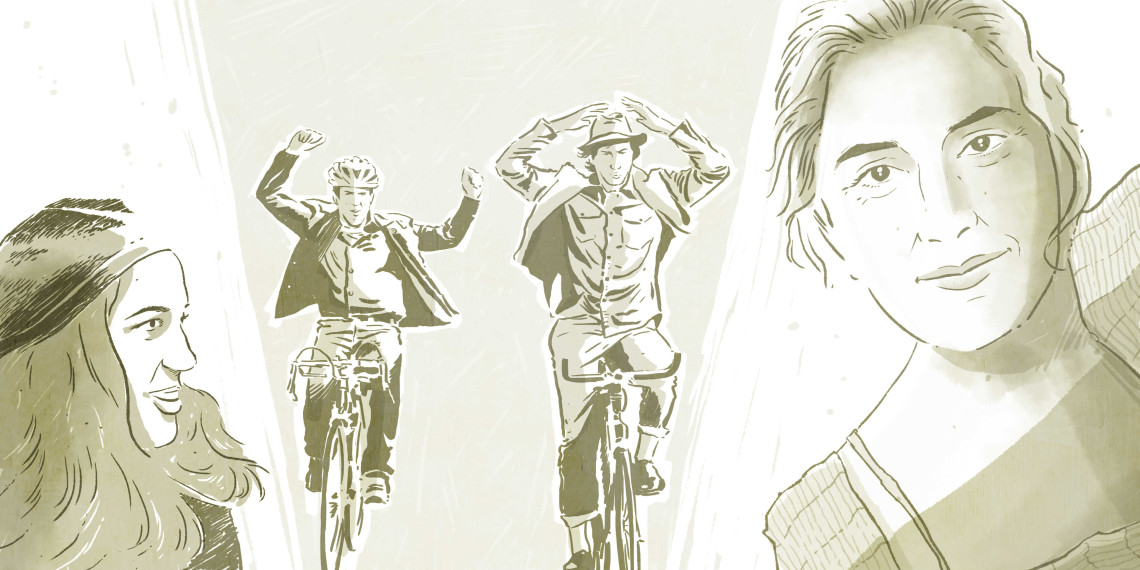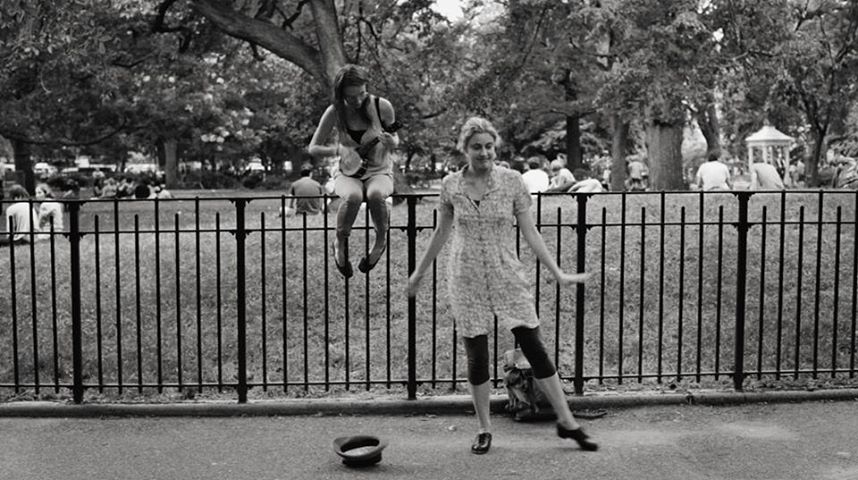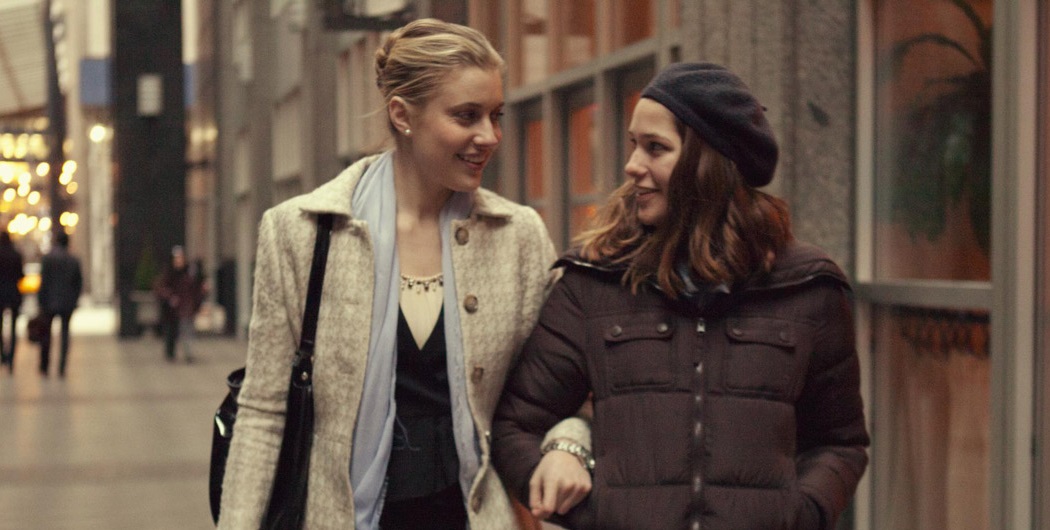Gracing the cover of the most recent issue of Film Comment are Greta Gerwig and Lola Kirke, staring into one another’s eyes, just under the headline, “Mistress America: I’ll Be Your Mirror.” The photograph, taken from a scene in which the trajectory of both characters’ happiness have the illusory quality of peaking, is representative of an unofficial Baumbach trilogy. In Frances Ha, While We’re Young, and Mistress America, Baumbach trades a caustic sense of humor for a more feathery one, all while retaining a melancholic undercurrent. Though earlier films like Margot at the Wedding, Greenberg, and The Squid and the Whale may be more upfront about this running theme of disappointment and a kind of anxiety about the world and one’s decisions, that Baumbach, and sometime co-writer/star/muse Gerwig have opted for a deliberately funnier brand of comedy only makes the Trilogy of Disappointment that much more filled with disillusionment.
Sure, Gerwig is about a decade or so younger than either of the leads in While We’re Young, but her place on the cover of that magazine makes the photograph, and the film itself, feel like the bookend to his trilogy—younger and older looking at one another, even through one another, neither necessarily willing to acknowledge just how bummed they are. They’ve realized that, along with the other protagonists in the aforementioned films, things haven’t gone the way they expected, and they seem to be trying desperately to discover what went wrong.
What is most apparent about Baumbach’s trilogy is that tragedy exists beneath a layer of exuberantly written and performed comedy. In an interview between Sarah Polley and Gerwig, the former notes that at the first screening of Frances Ha at Telluride, she “had this feeling of overwhelming delight.” She recalls, “[it] was this unmitigated joy of watching a movie, which I hadn’t felt in so many years…It was really strange to me recently, watching it again, watching it a few more times to realize the film is actually filled with this penetrating loneliness, which I somehow didn’t come away with the first time.” Later in the interview, comparing her character to that of David Thewlis in Mike Leigh’s Naked, Gerwig notes, “Frances embodied is very sad on the page.” That’s the clever trick of Frances Ha, While We’re Young, and Mistress America: Baumbach has two dramaturgical tones, but instead of clashing with each other, they feel instead more like layers to a cake. Getting each flavor is dependent on how you eat it.
In the case of Frances Ha (and, for that matter, the rest of the trilogy), hopelessness comes in ripples. Art imitates life in that we don’t feel Frances’s dejection in the immediacy of the moment. Instead, it is felt seconds, even moments afterward, in the silences and conflicted expressions that follow. To articulate these moments, Baumbach favors close-ups and medium shots of Frances’s literal and metaphorical solitude: She rides an elevator down by herself, surrounded by the belongings she has to put into storage, as she has no place to live; she lays nearly submerged in the water, her mother outside the door asking how much longer she’ll be; she runs to an ATM and contemplates whether it’s worth paying the extra fee to withdraw money; she wanders around Paris. In these moments, Gerwig’s subtly expressive acting takes center stage. The inner monologue written on her face is as loquacious as she is by nature, as if she’s arguing with herself, debating whether or not to confront the realities of her situation: She’s an unemployed dancer, a graduate of Vassar with no steady place to live, and her relationship with her best friend Sophie (Mickey Sumner) has shifted tectonically, rocking Frances to her core.
She has not taken over the world with Sophie, as they had intended; she is not a famous modern dancer; Sophie has not published a book about her that d-bags they make fun of have on their coffee tables; she does not co-own a vacation apartment in Paris or have lovers; she has not spoken at graduations; she does not have honorary degrees. This sadness dissipates when distracted by something and/or someone else, when not alone. There’s always a distraction. “This is the best night I’ve had since Sophie dumped me,” Frances tells friends Lev and Benji. But that loneliness always returns, even after a gallivant through the city to David Bowie’s “Modern Love.” She articulates her desires in her monologue about “that thing where you’re with someone and you love them and they know it.” Though she’s technically talking to someone, it serves more to reaffirm for herself a reason to keep going. “You sound really good!” Sophie tells Frances over the phone as the latter is in Paris. “I—I am really good,” Frances says, her voice breaking. Certainly part of the success of this film is its ability to read the different connotations and feelings of being alone: elation and seclusion, ebullience and emptiness. Eventually, these protagonists do come to reconcile with the fact that their imagined lives and realities don’t resemble one another, with the film’s final sequence of shots—especially a push-in to Frances’s face—suggesting a sense of hope. Nevertheless, in these moments of isolation, as romantic in their ability to evoke a similarly beautiful pain as anything produced by Nouvelle Vague filmmakers like Jean-Luc Godard and François Truffaut (think Anna Karina and Jean-Pierre Léaud standing against a wall as if everything was fine in Godard’s Vivre sa vie and Truffaut’s The 400 Blows, respectively), you can tell part of Frances’s inner monologue is, “What went wrong?”
The passage from Henrik Ibsen’s A Master Builder that begins While We’re Young suggests one of the film’s themes—the disappointment its two middle-aged main characters feel in their lives—but not its take on generational differences. The relationship between Josh (Ben Stiller), a kind-of-failing documentary filmmaker, and his wife Cornelia (Naomi Watts) have with Jamie (Adam Driver) and Darby (Amanda Seyfried) is fantastical, with the older couple enamored less with the younger couple as people than with what they represent as far as what could have been. Darby enthusiastically describes her wedding to Jamie, talking about the mariachi band and slip ’n slide that were a part of it, and, with a fragile smile, Cornelia replies that she and Josh had their wedding at City Hall. Josh is more explicit in his disappointment, which manifests itself in an excitement with the younger couple that smacks of desperation: He showers compliments on them effusively, and he’s much quicker to imitate Jamie’s lifestyle (hats, glasses, shoes, a cassette-tape iPhone case). Cornelia’s anxiety is slightly more internalized, bubbling over in scenes such as the baby dance class, in which, as her bubbly acquaintances swarm her with questions about when she will have children, she suddenly feels overwhelmed by what she perceives as compulsory societal pressure. If anything, the film is more centered on Josh’s disappointment, since he’s boxed in by two generations: Jamie’s eternal youth and fervor; and the acuity and legacy of his father-in-law, Leslie Breitbart (Charles Grodin), a famed documentary filmmaker soon to be honored by the Film Society of Lincoln Center. If Leslie is what Josh wanted to be, Jamie is the second chance he doesn’t actually get to have. “I’m so proud and selfish. I want to be generous like you,” he says dazedly to Jamie while intoxicated on medicinal hallucinogenic goop at an ayahuasca ceremony. “Before we met, the only two feelings that I had left were wistful and disdainful.”
If Frances Ha is all about the loneliness of one person, While We’re Young observes the loneliness that’s still possible even among two people. Missed opportunities seem to be the only thing binding Josh and Cornelia together—and not just regarding the possibility of having children. At one point, Cornelia chews out Josh, yelling, “We don’t go on vacations, we don’t make decisions, we don’t have kids!” They’re disappointed in themselves collectively. Towards the end, while they sit outside of Lincoln Center, Josh and Cornelia push through their disappointment and try to communicate again. After spending a few moments just looking past each other, Josh laments, “44 things I’ll never do, or never have.” On their faces, they both wonder, “What went wrong?”
Projection is an element in these three films, whether it’s Frances projecting happiness onto herself and her environment; Josh and Cornelia onto Jamie and Darby; or, perhaps most explicitly of all, as Tracy onto Brooke and Brooke onto the rest of the world in Mistress America. The disillusionment with life in the previous two films occupies itself primarily through single characters, but Mistress America allows disillusionment to be symbiotic between Tracy, an aspiring writer lost in the big city, and Brooke, an aspiring Jacqueline of All Trades—this time entrepreneur—lost in the big city, unable to invest in the things she does as much as she thinks. The difference between them lies not so much in age, but in performativity. Tracy’s naiveté grants her a little more honesty about the lack of self-actualization she’s had and is recklessly pursuing; Brooke, conversely, seems cognizant of her flightiness but deliberately ignorant of it. A reflexive defensiveness endures in what Tracy perceives as off-the-cuff witticisms. (“Do you know what an ‘autodidact’ is?” Brooke, who is not college-educated, asks. After Tracy nods, Brooke continues, “That’s one of the words I self-taught myself.”)
Through first-person narration of the short story that Tracy is working on, we see that Tracy is aware of just how ridiculous Brooke is. They treat each other as pets in different ways: Brooke as Tracy’s muse of whom she can be both admitting and deeply critical, and Tracy as Brooke’s impromptu confidant off whom she can bounce ideas without the commitment of long-term friendship. They both live, to each other, as reflections: Brooke as the person that, despite being enamored of her presence, is not what Tracy wants to be, a self-deluded broken young woman trying to fire on all cylinders without realizing she’s nearly out of ammo; and Tracy as someone still with the world at her feet. Its relationship to Frances Ha is more tangible principally because of Gerwig’s performance; the moment she arrives onscreen, the film’s pace quickens and one struggles, like Tracy, to keep up with Brooke, who uses this pace as an excuse to ignore the fact that her world starts to crack. But out on the street in the city, right after an investor meeting, the two look at each other: at first with all the hope and possibility one could imagine, but then with the realization that this moment is transitory. They silently ask one another, “What went wrong?”
The stylization of these films—Frances Ha as 1960s French New Wave film in its effervescence, While We’re Young as 1980s adult comedy à la Broadcast News in its unmasking of maturity as adolescence, and Mistress America as Lubitschian screwball comedy finding potent pain in humor—could be said to express the subjectivity of certain characters, amplifying the real to the surreal, augmentations to distract themselves from their realities. Each character, despite being at different phases of their lives, have encountered the same terrifying existential questions of what their lives will be, and what they might have been. And it’s telling that all three films take place in New York City: It’s allegedly the place where dreams can come true, but, for a myriad of reasons, the dreams of Frances, Josh, Cornelia, Tracy, and Brooke didn’t pan out. These films have a reconciliatory nature to them: They accept the decisions they’ve made, for the most part, and for the better. From “what went wrong?,” these films progress to the more important question: “What’s next?”
—
Original illustration by Krishna Shenoi.





















4 thoughts on “You Can’t Always Get What You Want: Noah Baumbach’s Trilogy of Disappointment”
Pingback: "Mistress America" Is Fresh, Original, and Marvelous | Movie Mezzanine
Pingback: Great Screwballs of Fire: The Emergence of the Neo-Screwball Comedy | AKLASU
Pingback: ICYMI Monday: Smattering of Summer | And now we turn to
Pingback: Everything Becomes Pure Want: 15 from 2015 « I Like Things That Look Like Mistakes